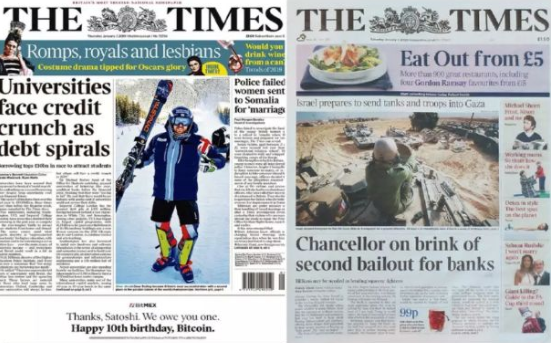Can Bitcoin replace gold, currency, and financial systems?
Bitcoin is not just a question of money, it is about freedom.
It is often said that bitcoin is going to replace gold, to replace money or in the financial system, but in fact the goal of bitcoin has never been this, it is more like a substitute.
This article is divided into two parts, first explaining the main reasons for the birth of Bitcoin, and then exploring whether it can become a substitute for the current financial system. To this end, let us first introduce the way the financial system works.
Modern financial system
- US traders push the bitcoin bull market to rebound, Asian traders still rely on wait and see
- Bitcoin lost $10,000, and the trend is finally here.
- Viewpoint | Blockchain don't pass the pass?

(New York Stock Exchange – a symbol of the current financial system)
The current financial system is subject to third parties who enforce the law and monopolize the system, allowing users to exchange currency without mutual trust.
In the past, people used to exchange goods in currency for face to face. With the development of online payment, the traditional way of value exchange has gradually disappeared. How to achieve mutual trust becomes more important at this time.
In the existing system, the government or financial institutions are actually some form of intermediary. Their existence ensures that two or more people can exchange value without mutual trust. It can be said that without such a third party, our financial system will collapse.
Despite the convenience of trading by third parties, this is at the expense of financial freedom.
In fact, the current financial system has limitations in two ways:
1. The only payment medium recognized by each country is only legal currency. When you want to exchange currency, you can only use the bank or other institutions, and the transaction fees and agency fees generated by this will be borne by us.
2. Except for cash, there is no privacy and freedom: all capital flows must pass through the central system.
Since the digitization of the currency, our privacy is slowly disappearing , because we will leave digital traces every time we trade. Financial institutions can collect large amounts of data that match individuals, and that data will ultimately be used by them, whether through marketing campaigns or trying to tailor the services that are right for you.
The end result is that we lose financial freedom, we have no control over our own funds, and our information becomes part of the current financial system.
Current weaknesses in the financial system
The current financial system has a trade-off between trust relationships and individual property freedom. Although it solves the problem of trust, this structure has great flaws:
1, single point of failure
The current system is top-down and is characterized as a third-party intermediary. This means that users are paying high intermediate costs because they cannot trade directly, and the system itself is centralized, and a single point of failure can lead to an overall failure. If you control the ZF crash of the current system, the entire system will also collapse.
2, not open
Due to its central nature, no one is allowed to join the system.
In fact, the top financial institutions act as gatekeepers. Due to regulations, they were asked to collect personal information from customers.
Therefore, the system is only open to those who are considered "trustworthy". This inevitably excludes all those who lack the necessary conditions from the system: the poor, the undocumented, and the persecuted.
In short, institutions that control the current financial system can arbitrarily decide who can enter or who cannot enter the global economy.
3, not without borders
Although we live in a globalized world, the economic system does not exist.
In fact, money is still country-centric. Cross-border and cross-border transactions are still inconvenient and costly. Even if our payment is electronic, if we pay from another country, we still have to charge an additional fee.
4. Easy to be reviewed
The current system allows for review, although this is a good thing in some cases (for example, for money launderers), but this power may also be abused, for example, when the United States uses the US dollar to impose sanctions on Iran and exclude it from the global economy. Time.

Therefore, Bitcoin's white paper will say:
We cannot achieve completely irreversible transactions because financial institutions will inevitably come forward to coordinate disputes.
The existence of financial intermediaries will also increase the cost of transactions , and limit the practical minimum transaction size, but also limit the daily micropayment transactions.
Because of the potential for a refund, the parties to the transaction need to have trust. Merchants must also be wary of their customers, so they will ask customers for completely unnecessary personal information.
The historical significance of Bitcoin
Now that we have talked about the current financial system, let's discuss the historical significance of Bitcoin creation.
The Bitcoin white paper was released in October 2008, when the world was in financial crisis. The first transaction took place on January 3, 2009. The transaction was embedded with the title of the Times, which reads:
"On January 3, 2009, the Chancellor of the Exchequer was on the verge of a second bail-out on the bank."

On the same day that Bitcoin was released, the US government provided the bank with $900 billion in bailouts. During the world financial crisis, the weakness of the trust-based financial system became particularly evident.
Now let's figure out the goals of Bitcoin and the reasons for its birth. Many people will confuse the answer to this question.
Many people believe that bitcoin was born with the idea of ruling the world: to replace the ambitious goals of the current financial system.
However, this has never been the goal of Bitcoin.
Conversely, anyone who has read the Bitcoin white paper knows that Bitcoin's goal is to provide a peer-to-peer alternative to the current financial system. An electronic cash that allows people to trade directly without the need for a financial institution or any third party.
It is based on the premise that the current trust-based system is flawed. In fact, even if banks and ZF have some problems dealing with value exchange, we still need to trust them.
We can only believe that they will not abuse their power, will not infringe on our privacy, and will not carry out dangerous operations on our funds. We can only believe that they will act in a moral and sincere manner.
However, in the past we have witnessed too many untrustworthy examples, the most obvious of which was the last economic crisis. It can be said that this is why Bitcoin was forced to be born: we must trust existing institutions because there is no other choice.
The emergence of Bitcoin has given us a lot of hope:
Become a peer-to-peer alternative to the current centralized system;
Provide economic freedom for people;
Let people have complete control over their funds.
How does Bitcoin replace third parties?
Now that we have figured out why Bitcoin was born, let's move on to the next step: How can it become a replacement for the traditional financial system?
As mentioned earlier, our current financial system relies on third parties to strengthen trust between two or more users who exchange value.
In contrast, bitcoin relies on cryptography.
The main problem that must be solved is the "double payment" problem, that is, how does A verify that B has not reused the money that is now sent to him?
Currently this problem is solved by a third party, checking whether there is duplicate payment for each transaction. However, this system has its own flaws, because the fate of the entire system depends on the entity that runs it, and every transaction must pass through them.
Bitcoin can solve this problem:
1. Peer-to-peer, distributed system architecture: Any computer connected to a Bitcoin network is usually defined as a "node."
2. A timestamp service in which each transaction that occurs has a timestamp. It is chronologically shared with each node of the network, confirming that certain data must exist at a particular time.
3. Based on the calculation method of consumption, it is proved that the transaction is effective: in order to prove that the transaction is effective, it is necessary to run the node calculation, and at this time, the time and power consumption of the CPU is the consumed resource.
Therefore, the previous trust model was replaced by a new model in which the payee needed to prove that most nodes agreed to be valid when trading, that is, the money was not reused before. Over. However, this process is performed automatically by the network: the user does not need to self-certify.
All of these factors put together the blockchain underneath Bitcoin without relying on financial intermediaries or third parties, but on a distributed system that fully understands the correct transaction history at any time.
Bitcoin is the only alternative to the current financial system
Visible from above:
1. The purpose of Bitcoin creation is to be a substitute for the current financial system (rather than replacing it!)
2, it has a decentralized system, no need to trust third parties;
3. In the blockchain technology at the bottom of Bitcoin, third parties are replaced by sound cryptography;
4. Allow peer-to-peer transactions, reduce intermediate costs, fraud and disclosure of privacy;
5. The most important point is that it allows users to fully control their funds.
The purpose of this article is not simply to explain the internal operation of Bitcoin, but to present different views on Bitcoin. After all, it has been misunderstood since the birth of Bitcoin, and it has also been used by the media and experts to achieve the goals they want to achieve: more fame, more viewers, more clicks.
Bitcoin is more than just a technology, it is a substitute for the current financial system. It is secure, decentralized, open, and cannot be reviewed or closed. Our reliance on third parties makes the current system inefficient, vulnerable to abuse of power and manipulation, and full control of our funds should be people's Basic rights, this is why Bitcoin is so important.
Source: Block wave
We will continue to update Blocking; if you have any questions or suggestions, please contact us!
Was this article helpful?
93 out of 132 found this helpful
Related articles
- The fundraising of $1.7 billion has been low-key, and will the upcoming Telegram blockchain be supervised?
- BTC fell below 10,000, 1.5 billion overnight evaporation, CME is the culprit?
- Getting started with blockchain | What are the stable currencies USDT and Libra? what's the effect?
- Jailbreak, low profits, risk-free arbitrage in the currency circle is a dream or a bubble?
- Research Report | There are more newcomers in the stable currency market, and the “institutional giants” are rushing to the beach.
- Economic Daily: Blockchain expands the real economy application scenario
- From the Internet yesterday, look at the blockchain tomorrow




